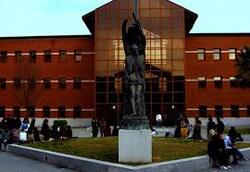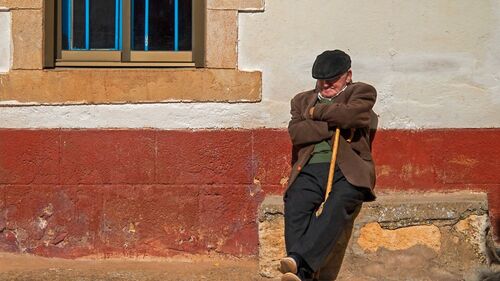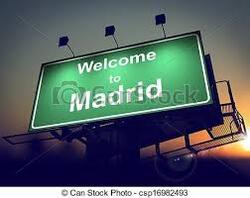-
Spain key numbers:
- Surface Area : 504.782 km²
- Capital : Madrid (3,2 millions inhabitants)
- Main cities : Madrid, Barcelona, Valencia, Séville, Bilbao
- Official Language : Espagnol (basque, catalan, galicien, valencien)
- Currency : Euro
- Spain’s national Day: 12 October (America’s discovering)
Spain is constitutional monarchy in which the chief of the state is the King.
The executive power is exerced by the government and the legislative power is for the Parliament, The judicial power is independent from these.
It is managed by the president of the government
So Spain is defined as a constitutional parliamentary monarchy. It is based on the constitution of 1978. That constitution made Spain a country in which the king reign but doesn’t governs. The consititution also involves that all the regions of Spain are autonomous communities.
The governement has to deal with the international politic, manage justice and econonomy, national defense and make laws for the state.
The autonomous communities have to planify and develop their economies, use their ressources , protect environment, deal with education and health.
Spain is a kingdom. The king is the chief of the state, the chief of the army. He has to stay above all the governement businesses. He can’t intervene in it. He represent the unity of the state, and the country in the international relations.
The king can’t dissolve the Parliament, and can make a proposition about who will preside the government but it’s only a proposition.
The succession on the throne is hereditary, and follow the musculine line.
The Spanish constitution is based on a principle of separation of powers. There are three differents powers : legislative, executive and judicial.
The three different powers of the state :
- The legislative power is under the responsability of the Parliament. This Parliament is composed of the House of the Representatives and the Senate.
· The House of Representatives create, vote, and modify laws. For the vote of a law, the House of Representatives vote, and then Senate vote. The Constitution alows the king to enact or not laws. They also deal with the budgets of the State, control the government action and deal with the attribution of the taxation, ect … The organization and the dissolution of that House of Representative depends on the government. It is composed of three hundred fifty deputies elected by proportional universal suffrage. There are fifty province in Spain. They all have an inital number of deputies an they can add some deputies depending on the number of inhabitants. Deputies are elected for four years.
· The Senate is the territorial representation room. It is composed of comunity senators elected by majority vote by the Assembly of each Autonomous Community. There are four senators in each province. They are elected for four years. They have a « veto » right.
- The executive power is under the responsability of the government chaired by the president of the government. The president of the government is the person in charge in front of the Parliament. He is assisted by the vice-president and he is in charge of appointing or remove ministers. There are fourteen miniters.
The election of the president of the government is indirect, by the legislative power for four years. The king can propose a candidate for the presidency of the governement. This candidate explain its program to the House of Representatives. To be elected he needs half and one poll. If the candidate is not elected, there is a new vote. Then, the president of the government take oath to the Constitution and the King.
The government of Spain is composed by the ministers council and by the government delegated commissions.
· Council of the miniters : it is a whole collegial body created and eliminated by the Royal Decree of the Ministers Council, with a proposition of the President of the Government
- Judicial power : he is directed by the courts of justice. It is devided according to the following classification :
- Prosecution court : directed by the public prosecutor, named by the King. He defends the respect of the law, the citizens interests, and the independance of the judiciary
- Supreme court : it is the cassation court, situated in Madrid.
- National Audience : deals with the national affairs
- Territorial or provincial audiences : act in the provinces or in the autonomous commnunities.
The autonomous communities have a president, an elected autonomous assembly, and autonomous courts.
Currently, in Spain, Mariano Rajoy is the president of the government, since the 21th December of 2011. And the actual king is Felipe VI, since the 19th June of 2014.
Spain map :

 votre commentaire
votre commentaire
-
My university in Madrid is named Universidad Rey Juan Carlos.
This is one of the most important University in Madrid. There are 5 campuses :
- Alcorcón
- Fuenlabrada
- Manuel Becerra
- Móstoles
- Vicálvaro.
Each campus has a specific study domain. So, as I am studying Business, I have been assigned to the campus of Vicálvaro. It is situated out of Madrid, and it takes aorund forty-five minutes by metro, to go there.

For the first day, we all had a meeting at 10AM, in the main amphitheater. All the erasmus was here. During this meeting the person in charge of the campus Vicalvaro, and the person in charge of the erasmus students have presented themselves, and have presented the University.
Then, we received and completed all the papers to choose our courses.
The university organizes in each begining of semester two weeks during which erasmus people can try diffrents courses to choose the best ones. So during the two first weeks, we have try differents courses to finally choose the ones we had prefered.
So we have choose :
Computer sciences applied to marketing
- Production management
- Marketing management
- Introduction au marketing
- History of the commercial culture and society
- Audiovisuel communication and Education
All these courses was « lecture courses », only the teacher was speaking and we have exercises to do for the class after. We also have presentations to do for the end of the semester.
Cultural differences
We have observed a few differences between French and Spanish classes.
First of all, spanish students speak very very loud in class, even when the teacher is speaking. There is not the same respect than in France.
Then, Spanish students use their phones, drink, and even eat in class. I remember that one day someone brought a box of pasta and ate it during the class.
I also saw that Spanish student come very rarely in class. In my Production Management class for exemple, during the courses the class was just half full, and the day of the mid-term exam, there wasn’t enough place for everybody in the same class.
Finally, people can come and leave the class at any time, without informing the teacher.
So I think that the University is very different of our school.
Social life
There are many programs for erasmus student. There is the ESN club that organizes trips, and parties. For exemple, I have been in Toledo with them. This is a trip that they had organize and everybody could participate for 25€.
There is also a sport club where we registered with Anne-Laure. We can go every time we want and there is also Salsa, Dance, Boxe, Step, classes where we can go, and meet Spanish students.
But in general Spanish people are together and don’t mix very much with erasmus students. Most of them don’t speak English very well, and do not want to do efforts.
 votre commentaire
votre commentaire
-
El ritmo de vida
Spanish timming and rythym are clearly differents that french one ! When we are going on holidays, it can be enjoyable to have lunch at 4PM and go shopping until 9PM, but when we have school it is more complicated.
I’m in Madrid since almost 3 months now, but I’m always keeping french timming in my mind. It’s undeniable spannish peope are much more relax than us, never in a hurry, speak very loud. But their love of life rectify everything. Spanish people will always be here if you have a problem, in class, in the street, …
Hours
In France, we have lunch around 12AM or 1PM. In spain they have lunch between 2 or 3PM until 4 or 5PM. The first time I went to a restaurant, I arrived around 12PM and it was totaly empty, but when I left at 2 :30PM the restaurant was full.
And all the stores have the same timing. It’s close between 1PM and 4PM, and it’s open until 9 or 10 PM.
For my clases, it starts much later than in France (around 2 or 3 PM) but ends much later too (around 8 or 9PM). And spannish people always make long pauses between the clases.
So I would say that it’s very easy to take spannish timing, but less to re-adapt ourselves to the French timing
 votre commentaire
votre commentaire
-
« Podemos » is a political party created in January 2014 by Pablo Iglesias. It registered as a political party in March 2014 to participate to the European Election. In May 2014 it was already the 4th political party in Spain and w
on 5 seats in the European Parliament.
This party federate people who feels « abandoned » by the ruling class, which is considered like non able to respond to the society’s needs.
The party is taking advantage of this people’s abandon feeling and get the growing indignation and anger together.
Pablo Iglesias has actually declare « Podemos was born in Spain beacause a possibility of political action appears » and he describes himself like « an activist who puts himself on service to everybody »
The « Podemos » are young, and a party from the extreme left.
They have an ideology very near to the extrem left, but doesn’t want to have a clear position in the political range. About that, Pablo Iglesias has declared « this is not about right or left, but about democracy or tyranny »
The podemos’s political platform is similar to Syriza’s one. Syriza is the grec political party of extrem left. Their aim is denouncing all the political corruption scandals of all the others political party. They want to change demand and claim into a real political change.
Concretely, they are fighting against illigitimate debt, the expulsions, the reductions in the education’s and health’s finances, the recent graduated’s forced exil. But their programme is softer since the European Elections.
This year is a very busy electoral year in Spain, and Podemos decided that they were not ready to be elected. So they only decided to be present in some little municipalities.
They have no elected mumber on the territory yet. So they are very expected and watched.

 votre commentaire
votre commentaire
-
Hi !
My name is Agathe, and I'm doing my semester abroad in Madrid, in the university Rey Juan Carlos. I'm here since one month now. I have to say that it was a little difficult in the begining. I was a little bit sad to leave my friends and my family, and move in a country and in a city that I absolutely don't know. Spain is actually a very different country compares to France. But I like their way of life.
 votre commentaire
votre commentaire




